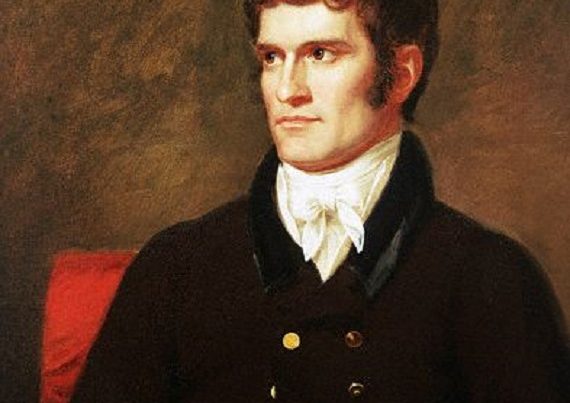In a recent interview on Sirius XM, President Trump, now completely enthralled by Andrew Jackson, made a couple of interesting remarks about the War of Northern Aggression, specifically theorizing that if Andrew Jackson were President in 1861 there would have been no war. Trump’s reasoning? One could presume because Jackson had averted war in 1832 during the nullification crisis.
What can we make of this?
Most historians don’t like to get into hypotheticals because such assumptions are unprovable – in this case there’s really no sure way to know exactly what Jackson would have done in 1861. But aside from the fact that Old Hickory was dead and buried for 16 years before the war, a fact that Trump alluded to, we can speculate that there’s a good chance the irascible Jackson would have acted precisely as Lincoln had – with violence, because that’s what he was planning in 1832 and had authorization with the Force Bill. There would most likely have been bloodshed over the tariff if a compromise had not been reached.
So I would say on this aspect of the President’s remarks: History 1. Trump 0.
But Trump also thought the war could have been averted altogether. “People don’t realize, you know, the Civil War, if you think about it, why? People don’t ask that question, but why was there the Civil War? Why could that one not have been worked out?”
Historians, though, have long asked that question. And I think it’s safe to say that the war could have been prevented, as most wars in history fall into the ‘repressible’ category.
So here we can side with the President: History 1. Trump 1.
But of this we can place the blame squarely on the North, for it was the North that persisted in antagonizing and threatening the South, not the other way around. Southerners were very Jeffersonian in their political views and did not, at anytime, seek domination of the Northern states. As John C. Calhoun once asked, “When did the South ever lay its hand upon the North?”
It was in 1858 that a Northern politician, William H. Seward, referred to the situation then brewing in the country as a “irrepressible conflict,” a remark seen as aggressive enough to deflate his own run at the Republican presidential nomination in 1860.
But in the days before this new Republican Party, which began in 1854, the North was largely Jeffersonian in outlook as well as the South. Even though there were only three Southerners who served as President between Jackson and Lincoln (and one of them was accidental), until Lincoln even Northern Presidents were men of Southern principles, which were, in reality, American ideals.
By 1860 things had changed. As Professor Clyde Wilson has written in his great book, The Yankee Problem in America, the North became dominated by “Yankees,” whom he accurately describes as “that peculiar ethnic group descended from New Englanders, who can be easily recognized by their arrogance, hypocrisy, greed, lack of congeniality, and penchant for ordering other people around.”
The North, he continued, “had been Yankeeized, for the most part quietly, by control of churches, schools, and other cultural institutions, by whipping up a frenzy of paranoia about the alleged plot of the South to spread slavery to the North, which was as imaginary as Jefferson’s guillotine.”
The South never threatened the North, never agitated about Yankee wage slavery and sweatshop labor, nor condemned Northern social arrangements, like child labor (even though young slave children did not work on plantations). Furthermore, according to economic scholar Frank Taussig in Tariff History of the United States, the North was fleecing the South, which, as a region, accounted for up to 80 percent of all US tariff revenue, while most of the money was spent on infrastructure in the North.
So if any section had cause for complaint it was the South, not the North. Had it not been for Northern agitation, and Yankee penchant for rejecting compromise efforts, not to mention John Brown’s War, which was supported by prominent men in the North, perhaps war could have been averted.
But when the South realized the “Yankees” were in charge, that the end of Jeffersonian America was upon them, that it was now downright dangerous to remain in the Union, they decided to exercise their rights as free men and determine their own future, just as their forbears had with the American revolution.
As for the issue of slavery itself, why did it take a war to end it? Jim Powell, in his book Greatest Emancipations: How the West Ended Slavery, points out that the US is the only Western nation to end the institution with a bloody war. Not even Brazil, which had the most brutal and entrenched system in the world, resorted to violence. It ended peacefully in the 1880s.
Most likely the same fate would have befallen the South by 1900. So it shouldn’t have required 750,000 deaths to achieve the end of slavery but that was the Yankee price for destroying Jeffersonian America, the real goal of the war. Now Lincoln was free to put in place the old Whig economic program and fasten on the new nation policies the South no longer wanted to live under.






